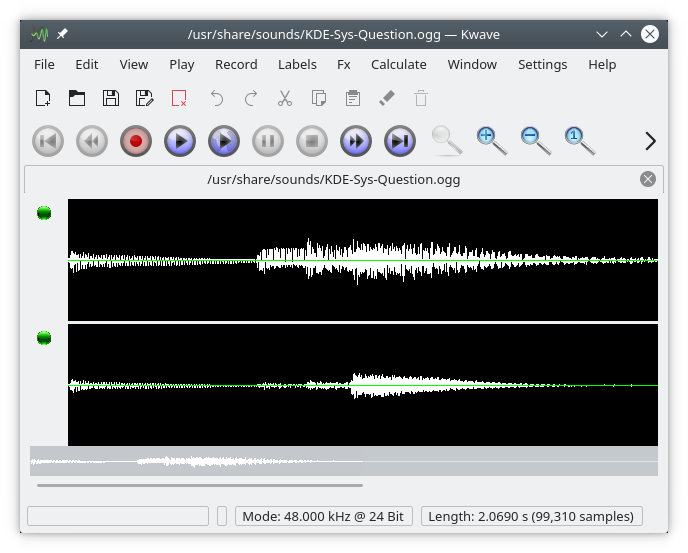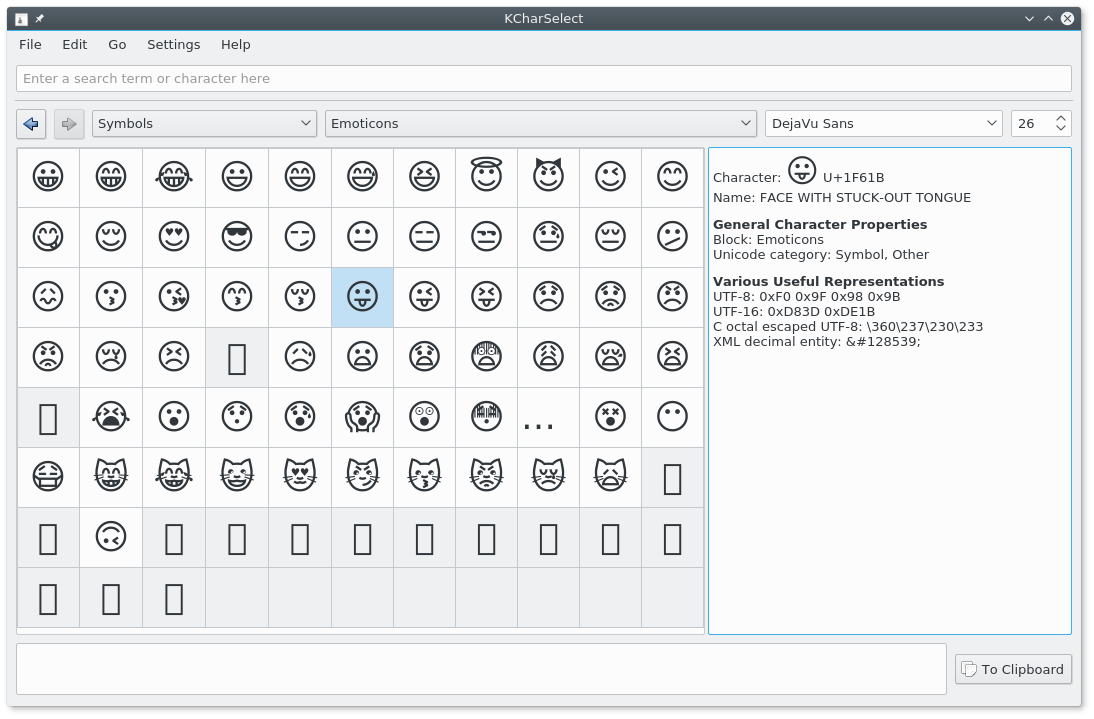KDE veröffentlicht die KDE-Anwendungen 16.12.0
December 15, 2016. Today, KDE introduces KDE Applications 16.12, with an impressive array of upgrades when it comes to better ease of access, the introduction of highly useful functionalities and getting rid of some minor issues, bringing KDE Applications one step closer to offering you the perfect setup for your device.
Okular, Konqueror, KGpg, KTouch, Kalzium and more (Release Notes) have now been ported to KDE Frameworks 5. We look forward to your feedback and insight into the newest features introduced with this release.
In the continued effort to make applications easier to build standalone, we have split the kde-baseapps, kdepim and kdewebdev tarballs. You can find the newly created tarballs at the Release Notes document
We have discontinued the following packages: kdgantt2, gpgmepp and kuser. This will help us focus on the rest of the code.
Kwave-Sound-Editor neu in den KDE-Anwendungen

Kwave is a sound editor, it can record, play back, import and edit many sorts of audio files including multi channel files. Kwave includes some plugins to transform audio files in several ways and presents a graphical view with a complete zoom and scroll capability.
The World as your wallpaper

Marble now includes both a Wallpaper and a Widget for Plasma that show the time on top of a satellite view of the earth, with real-time day/night display. These used to be available for Plasma 4; they have now been updated to work on Plasma 5.
Sie finden weitere Informationen im Blog von Friedrich W. H. Kossebau.
Emoticons galore!

KCharSelect has gained the ability to show the Unicode Emoticons block (and other SMP symbol blocks).
It also gained a Bookmarks menu so you can favorite all your loved characters.
Math is better with Julia

Cantor has a new backend for Julia, giving its users the ability to use the latest progress in scientific computing.
Sie finden weitere Informationen im Blog von Ivan Lakhtanov.
Advanced archiving

Ark hat jetzt mehrere neue Funktionen:
- Dateien und Ordner können im Archiv umbenannt, kopiert und verschoben werden
- It's now possible to select compression and encryption algorithms when creating archives
- Ark can now open AR files (e.g. Linux *.a static libraries)
Weitere Informationen finden Sie im Blog von Ragnar Thomsen.
And more!
Kopete got support for X-OAUTH2 SASL authentication in jabber protocol and fixed some problems with the OTR encryption plugin.
Kdenlive has a new Rotoscoping effect, support for downloadable content and an updated Motion Tracker. It also provides Snap and AppImage files for easier installation.
KMail and Akregator can use Google Safe Browsing to check if a link being clicked is malicious. Both have also added back printing support (needs Qt 5.8).
Aggressive Pest Control
More than 130 bugs have been resolved in applications including Dolphin, Akonadi, KAddressBook, KNotes, Akregator, Cantor, Ark, Kdenlive and more!
Vollständiges Änderungsprotokoll
Eine vollständige Liste der Änderungen finden Sie hier.Sagen Sie es weiter
Nicht-technische Mitwirkende sind ein wichtiger Teil des Erfolgs von KDE. Während proprietäre Softwarefirmen riesige Werbebudgets für neue Software-Veröffentlichungen haben, ist KDE darauf angewiesen, dass Menschen mit anderen Menschen sprechen. Selbst für diejenigen, die keine Software-Entwickler sind, gibt es viele Möglichkeiten, die Veröffentlichung von KDE-Anwendungen zu unterstützen. Berichten Sie Fehler. Ermutigen Sie andere, sich der KDE Gemeinschaft anzuschließen. Oder unterstützen Sie die Non-Profit-Organisation hinter der KDE-Gemeinschaft.
Bitte verbreiten Sie die Nachricht im sozialen Netz. Senden Sie Neuigkeiten an Nachrichtenseiten, nutzen Sie Kanäle wie delicious, digg, reddit und twitter. Laden Sie Bildschirmfotos Ihrer neuen Einrichtung auf Dienste wie Facebook, Flickr, ipernity und Picasa hoch und posten Sie sie in entsprechenden Gruppen. Erstellen Sie Bildschirmaufzeichnungen und laden Sie diese auf YouTube, Blip.tv und Vimeo hoch. Bitte kennzeichnen Sie Beiträge und hochgeladenes Material mit „KDE“. Das macht sie leicht auffindbar und gibt dem KDE-Promo-Team eine Möglichkeit, die Berichterstattung über diese Veröffentlichung von KDE-Anwendungen zu analysieren.
Binärpakete für KDE-Anwendungen installieren
Pakete
Einige Anbieter von Linux-/UNIX-Betriebssystemen haben dankenswerterweise Binärpakete der KDE-Anwendungen für einige Versionen Ihrer Distributionen bereitgestellt, ebenso wie freiwillige Mitglieder der Gemeinschaft. Zusätzliche binäre Pakete und Aktualisierungen der jetzt verfügbaren Pakete werden in den nächsten Wochen bereitgestellt.
Paketquellen
Eine aktuelle Liste aller Binärpakete, von denen das KDE-Projekt in Kenntnis gesetzt wurde, finden Sie im Community Wiki.
Kompilieren von KDE-Anwendungen
Der vollständige Quelltext der KDE-Anwendungen kann kostenlos und anonym heruntergeladen werden. Anweisungen zum Kompilieren und Installieren finden Sie auf der Infoseite der KDE-Anwendungen 16.12.0.
KDE unterstützen
KDE ist eine Gemeinschaft für Freie Software, die nur existiert und wächst, weil viele Freiwillige Zeit und Mühe aufbringen, um zu helfen. KDE sucht stets nach neuen Freiwilligen und Beitragenden, ganz gleich ob es um Hilfe bei der Programmierung, Fehlerbehebungen oder Fehlermeldungen, das Erstellen von Dokumentation, Übersetzungen, Werbung, Geld oder was auch immer geht. Alle Beiträge sind höchst willkommen und werden gerne angenommen. Für weitere Informationen lesen Sie bitte die Seite KDE Unterstützen oder werden Sie ein Unterstützer des KDE e.V. im Rahmen unserer Initiative Join the Game.
Über KDE
KDE ist ein internationales Technologie-Team, das freie Open-Source-Software für die Arbeitsfläche und Mobilgeräte erstellt. Zu KDEs Produkten zählen ein modernes Arbeitsflächen-System für Linux- und UNIX-Plattformen, leistungsfähige Lösungen für Office und Groupware sowie Hunderte von Software-Titeln in vielen Kategorien inklusive Internet- und Web-Anwendungen, Multimedia, Unterhaltung, Bildung, Grafik und Software-Entwicklung. KDE-Software wird in mehr als 60 Sprachen übersetzt und mit Benutzerfreundlichkeit und zeitgemäßer Zugänglichkeit im Hinterkopf entworfen. KDEs leistungsfähige Anwendungen laufen nativ unter Linux, BSD, Windows, Haiku und Mac OS X.
Markenzeichen-Hinweise.
KDE® und das „K Desktop Environment“®-Logo eingetragene Markenzeichen des KDE e.V..
Linux ist ein eingetragenes Markenzeichen von Linus Torvalds. UNIX ist ein eingetragenes Markenzeichen von „The Open Group “ in den Vereinigten Staaten und anderen Ländern.
Alle sonstigen Markenzeichen und Copyrights in dieser Ankündigung sind Eigentum ihrer jeweiligen Inhaber.
Pressekontakt
Brauchen Sie weitere Informationen, dann senden Sie uns eine E-Mail. press@kde.org